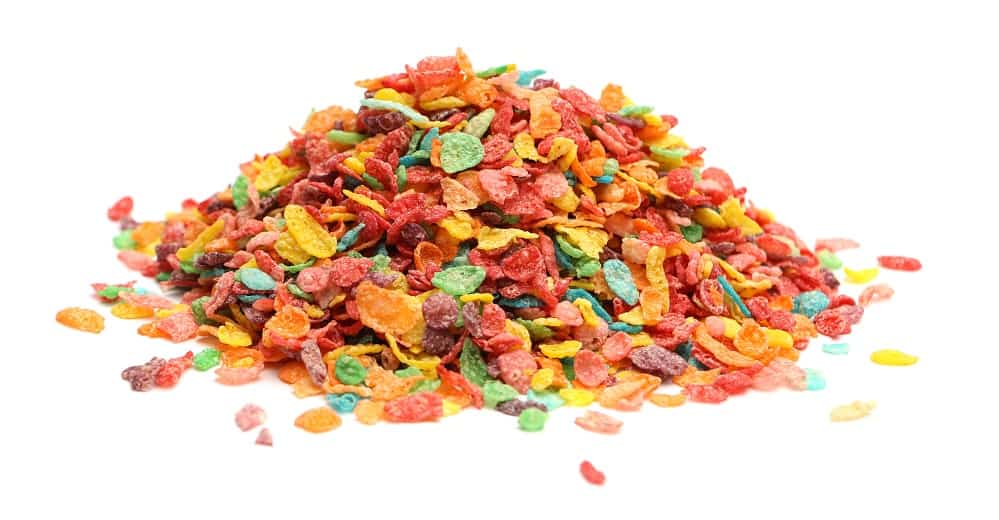Fruity Pebbles is a popular cereal brand that contains crisp rice cereal bits that come in a variety of fruit flavors. Produced by Post Consumer Brands, the same company that produces other popular food products such as Cocoa Pebbles, Chips Ahoy!, Golden Crisp, Honey Bunches of Oats, and Post Raisin Bran. Fruity Pebbles is popularized by having the cartoon characters from The Flintstones as their endorser.
While Fruity Pebbles does not contain any obvious animal product or derivative, it is safer to assume that the cereal brand is not appropriate for vegans. Firstly, Fruity Pebbles fall under the same issues as other cereal brands that are fortified with vitamin D. Since the majority of commercially produced vitamin D uses sheep’s wool for its production, cereals that are fortified with the vitamin such as Fruity Pebbles are unlikely to be vegan. Furthermore, the cereal brand also contains a few ingredients that are also problematic for vegans such as sugar, natural flavor, and food coloring agents.
Table of Contents
Are Fruity Pebbles Vegan?

Fruity Pebbles is a popular cereal brand that many people associate with its cartoon endorser The Flintstones. However, vegans might probably be wary of the cereal brand as it contains some ingredients of note. At first glance, Fruity Pebbles seem to be perfectly fine for vegans as most cereals do. Unfortunately, there are some ingredients that make this product unlikely to be vegan.
Fruity Pebbles Ingredients List
The list of ingredients of Fruity Pebbles includes (1): rice, sugar, canola oil, salt, natural and artificial flavor, red 40, yellow 6, yellow 5, turmeric oleoresin (color), blue 1, blue 2, BHT and BHA added to preserve freshness.
Vitamins and minerals: sodium ascorbate and ascorbic acid (vitamin C), niacinamide (vitamin B3), reduced iron, zinc oxide, vitamin A palmitate, pyridoxine hydrochloride (vitamin B6), thiamin mononitrate (vitamin B1), riboflavin (vitamin B2), folic acid, vitamin D3, vitamin B12.
Vitamin D
Humans require an incredibly long list of substances to maintain, repair, and develop the body. For the most part, people have to consume large quantities of macronutrients such as carbohydrates, lipids, and fats that the body significantly needs for growth and repair. However, there are some substances that are required in trace amounts – these are the micronutrients. One example of a micronutrient is vitamins. These are highly beneficial substances that help the body in many ways. However, there is one vitamin that vegans look out for in products: vitamin D.
Vitamins are primarily acquired through the diet. However, vitamin D is a unique vitamin in the sense that the human body can actually produce it. The UV radiation from the sun can help catalyze the conversion of a cholesterol found in the skin to become a functional form of vitamin D. However, even though people can make their own vitamin D, the vitamin can still be found and acquired in the food people eat.
While vitamins are essential and healthy for the body, vegans are wary of vitamin D in their food – especially if the presence of the vitamin is through fortification or active manipulation. This is because commercial vitamin D comes from a long history of coming from animals and animal parts such as brains, spinal cords, and livers. However, due to economic decisions, the prevalent method of producing commercial vitamin D nowadays is to extract grease from sheep wool and convert it into an active form of vitamin D (2).
There are some commercially available vitamin D products that are not derived from animals. There are some that are synthesized and there are some biotechnologically produced with the help of lichen.
Although there are vegan routes for vitamin D production, the fact still stands that almost all commercially produced vitamin D is produced using sheep wool right now. Thus, it stands that food fortified with vitamin D such as Fruity Pebbles is unlikely to be vegan.
Sugar
Sugar is a highly common additive in cereals such as Fruity Pebbles and it is also an incredibly common sweetener used in the entire food and beverage industry. Sugar is conventionally produced from plant sources such as sugarcane or sugar beets, but that does not mean commercial sugar is automatically vegan.
After the sugar has been extracted from its source, many sugar companies further refine the sugar to make it more appealing to the consumer market. Different refinement methods are used to make the sugar whiter and finer.
One such method used for refinement is filtration. Different companies could utilize different filtration methods. Most of them are perfectly fine for vegans such as the use of granulated carbon. However, some companies use bone char for their filtration step (3). Although bone char is a cheap and effective material for filtration, sugar produced with bone char can no longer be considered vegan since it is animal derived. Specifically, bone char is the ground and charred skeletal remains of various animals.
Sugar is usually considered a gray area ingredient because it is difficult to determine if whether it is truly vegan or not. Firstly, it is difficult to determine if sugar is produced using bone char. Secondly, a large food company such as Post Consumer Brands can possibly have multiple sources of sugar which means that the sugar they use can come from different sugar companies, each with different production and refinement methods. This makes tracing if a food item with sugar such as Fruity Pebbles is truly vegan or not.
The practice of using bone char for sugar refinement is more prevalent in the US which is why vegans from other parts of the world have no problem with sugar in their areas.
Natural Flavor
Natural flavors are common additives found in food and beverages. As an ingredient, natural flavors primarily act as flavoring agents – ingredients that essentially contribute to the flavor of the product. While most ingredients are required to be listed on the label, natural flavors allow companies to keep some proprietary information regarding how they develop their products. Although natural flavors are exclusively made with natural substances, as opposed to artificial flavors, the problem with natural flavors is the way the FDA defines them. Specifically, the FDA defines natural flavors as (4):
The essential oil, oleoresin, essence or extractive, protein hydrolysate, distillate, or any product of roasting, heating or enzymolysis, which contains the flavoring constituents derived from a spice, fruit or fruit juice, vegetable or vegetable juice, edible yeast, herb, bark, bud, root, leaf or similar plant material, meat, seafood, poultry, eggs, dairy products, or fermentation products thereof, whose significant function in food is flavoring rather than nutritional.
FDA.gov
As evident from the definition above, natural flavors are indeed composed of natural substances. However, the umbrella definition provided by the FDA is the main issue for vegans as natural flavors encompass both plant- and animal-derived products. Thus, unless a product is labeled or confirmed to be vegan-friendly, there is no way to determine if a product with natural flavors is actually vegan. This is why the ingredient is often considered a gray area ingredient.
Food Coloring Agents
Color is an important part of the consumer experience, especially when it comes to food and drink. Although some food products can come with visually appealing colors due to their natural ingredients, some products have to be actively manipulated to achieve a desirable color – this is where food coloring agents come in. There are many natural food color agents that vegans are fine with, but vegans have problems when it comes to artificial coloring agents.
Completely synthesized in laboratories, artificial coloring agents are completely devoid of animal products. However, the issue with artificial coloring agents is an ethical one. The problem with artificial coloring agents is that these substances have been known to undergo numerous animal testing studies.
Understandably, safety is a prerequisite when it comes to substances that are designed for human consumption. Food safety authorities are the principal organizations that make sure food and substances meant to be consumed are completely safe. For these food safety authorities to approve and certify that artificial coloring agents are indeed safe, they require these substances to undergo numerous safety tests which include the use of animal models.
However, the use of animal models for safety testing is considered to be highly unethical, especially by today’s standard as alternative methods can accurately evaluate food safety just as well without the use of animals. These methods can include using cell models and in silico studies (i.e., the use of computer modeling and algorithms).
Specifically, Fruity Pebbles contain red 40, yellow 6, yellow 5, blue 1, and blue 2. These are common artificial coloring agents and understandably, Fruity Pebbles use different ones for their colorful cereal bits. However, these artificial coloring agents have already been documented to be heavily used on various animals such as mice, rats, rabbits, dogs, pigs, guinea pigs, hamsters, and cats (5, 6, 7, 8, 9).
References
1. https://www.postconsumerbrands.com/
2. https://www.sciencedirect.com/
4. https://www.accessdata.fda.gov/
7. https://www.efsa.europa.eu/
9. https://efsa.onlinelibrary.wiley.com/
Featured Image Editorial Credit: TonelsonProductions / Shutterstock.com




